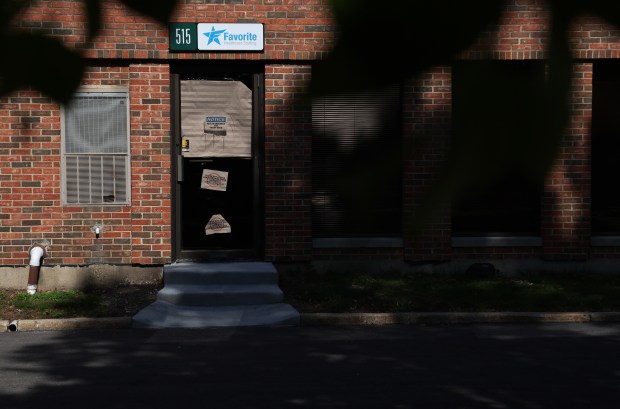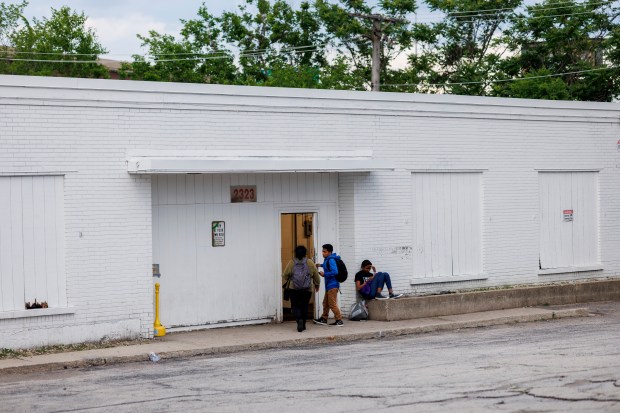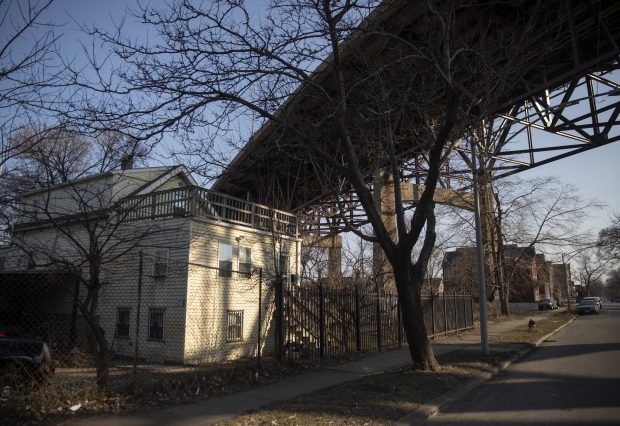When Brandon Johnson became mayor, he condemned an expensive staffing contract for migrant shelters that his administration inherited from his predecessor.
Now with the two-year mark of the city’s asylum-seeker crisis this month, the vendor Favorite Healthcare Staffing has billed over a quarter-billion dollars for running operations at the shelters, and is likely here to stay.
The out-of-state emergency staffing firm was first tapped by Mayor Lori Lightfoot in fall 2022 to run Chicago’s nascent migrant shelter system as busloads of Venezuelans began arriving in the city from Texas. That contract has remained the city’s costliest by far of the ongoing migrant situation, with almost two-thirds of the $433.7 million in total expenditures spent on asylum-seekers so far going toward Favorite Staffing, per city records from July.
The Johnson administration has touted rate negotiations that have driven down per-resident costs and have saved up to $3 million a week even as an earlier spike in the shelter population this winter contributed to a whopping $276.6 million bill from Favorite Staffing since the start of the migrant crisis.
But now, city officials who have in the past signaled they were searching for alternatives said they no longer expect to phase out Favorite Staffing from its role in the shelters.
In an interview with the Tribune, Department of Family and Support Services First Deputy Commissioner Jonathan Ernst said the city has determined Favorite Staffing’s ability to get the facilities up and running in short order cannot be replicated with cheaper local options given the constantly evolving nature of the asylum-seeker crisis.
More than 45,600 migrants have made their way to Chicago since 2022. Though its shelter population has sharply dropped in recent months, the Johnson administration has speculated that thousands more could be bused to the city ahead of the Democratic National Convention this month.
“We cannot predict what the landscape is going to look, coming from the border, nine months from now,” Ernst said. “I can’t speak to what the city would need in the future, but for this mission right now, Favorite is our solution.”
Procurement snags
A Tribune investigation from last October found a combination of premium rates and staggering overtime costs from Favorite Staffing heavily inflated migrant costs at the expense of taxpayers. Per a review of invoices obtained via public records requests, hundreds of Favorite Staffing employees logged work weeks of 84 hours or more during the first half of 2023. To cover security costs at just one shelter, the city at times paid $18,000 a day.
As Favorite Staffing’s share of total migrant expenditures rose to 71% during the fall and Johnson was attempting to pass his first budget while knowing a $150 million allocation could not cover all the 2024 asylum-seeker costs, his administration sought to reassure outraged aldermen that it was addressing the financial burden despite having earlier extended Favorite Staffing’s contract.
Johnson’s current chief of staff, Cristina Pacione-Zayas, had described the use of the Kansas-based vendor as both “exorbitant” and a “stopgap measure” that the administration was hoping to replace with local options. She pointed to a city-issued request for proposal to bring in community organizations that she said would be more fiscally sustainable and culturally responsive to the needs of migrants hoping to resettle in Chicago.
But ultimately, the solicitation that closed last year only resulted in local organizations replacing Favorite Staffing at two of the city’s migrant shelters — which Ernst said was the result of unexpected twists and turns of the humanitarian crisis.
“The reality is that we put that (RFP) out, and very soon after, we saw a huge surge,” Ernst said. “The mission totally flipped one way, and then after that, we saw it just cut down to more of a trickle compared to what we’ve seen. So this mission is constantly evolving.”
The city’s procurement rules mandate that the government can only seek vendors to staff migrant shelters that existed at the time the bid was issued, which was in the fall. That meant future sites that were propped up had to be operated by Favorite Staffing, while community-based organization were not viable solutions for existing shelters due for closures within six months, either, Ernst said.
“It doesn’t make sense to ramp up, have them hire staff, bring them on board to then a couple months later say, ‘All right. We’re closing this up,’” Ernst said. “It’s not fair to the CBO. It’s very disruptive and just wouldn’t be operationally a wise way to go.”
In April, just two community organizations won contracts to take over shelters from Favorite Staffing.
The Bright Star Community Development Corp. was awarded a contract to run the Young Women’s Leadership Academy shelter in Douglas until the end of this year. That nonprofit’s personnel costs are far less than Favorite Staffing’s; a manager makes a $112,000 annual salary while resident aides make $30,000 and case managers $29,000, with a total $2.5 million estimated cost. The contract allows for spending up to $12.5 million.
The city also began a contract with K.L.E.O. Community Family Life Center at the American Islamic College shelter in Uptown that runs for the same time period. This agreement budgets $57,700 for aides, $57,700 for social workers and $61,500 for security directors. The agreement estimates a $12.5 million budget but can go up to $62.3 million.
That means the city’s large apparatus of migrant shelters, peaking at 15,700 residents across 28 sites in December, was solely manned by Favorite Staffing during the winter surge and remains mostly run by that firm. But a new shelter RFP covering six of the 13 city-managed shelters means any of them could also transition to CBOs, per a DFSS statement.
There are currently 17 migrant shelters operating in Chicago, for a total of 5,600 residents.
New rates
In a June 2023 news conference, Johnson was quick to acknowledge the ballooning costs from Favorite Staffing.
“As far as the expense is concerned, unfortunately there was an agreement with a particular institution that was not necessarily economically feasible,” the new mayor said. “And so we’ve worked hard to renegotiate the contract, and we’re grateful that there’s been some cooperation.”
Johnson was taking credit for a new agreement that was actually hashed out under Lightfoot and took effect in mid-April before he assumed office. Since then his administration has clinched two other renegotiations of the Favorite Staffing deal.

A Tribune analysis of city invoice data found taxpayers indeed now pay Favorite Staffing less per shelter resident, though expenses still went up to as high as $6.5 million a week in February. Ernst said the city would have paid about $3 million more per week during that time pre-renegotiation because of higher per-employee rates.
That weekly savings estimate has gone down to about $2.4 million since then, however, thanks to staff cuts of over 500 employees due to a decrease in shelter population. In June, Favorite Staffing’s weekly costs had trimmed to about $3.4 million a week, Ernst said.
The Tribune analyzed data from city officials and the city’s public cost dashboard to verify the estimates. A rolling four-week average shows the dramatic rise in charges by Favorite Staffing that began last year indeed coincided with the jump in city shelter intake, followed by a steady drop during the late winter as shelters began to empty and close.
The deal at the end of Lightfoot’s term slashed the highest Favorite Staffing wage — for shelter managers — from $150 an hour to $120 an hour, while wages for the most common role — resident aide — went from $75 an hour to $50 an hour, according to DFSS. Security guards and case managers both went from making $100 in hourly wages to $80.
The two renegotiations under Johnson established a “travel rate” and a “local rate,” Ernst said. The administration sought to especially tamp down the pay for non-managerial hires that live nearby and do not have to account for transportation and lodging costs.
Johnson’s first deal took effect at the end of last September and dropped hourly pay for local shelter managers to $100, for resident aides to $42, for security guards to $48 and for case managers to $56. The travel rates remained the same as the $120 and $50 hourly wages for the two roles, while security guards and case managers from out-of-state made $68 and $76 per hour, respectively.
A second reduction took effect at the start of June. This deal dropped local shelter manager pay to $90 an hour, resident aide pay to $40 an hour, security guard pay to $45 an hour and case manager pay to $52 an hour.
Being paid the local rate does not mean the employees are local residents, however. All workers who have been employed at the shelters for extended periods are now required to figure out their own living situations and transit to work, and are given a “local” classification, Ernst said.
That means this label now comprises 95% of Favorite Staffing’s workforce. As of the end of July, about 45% of the 772 Favorite Staffing employees across city shelters were actual Chicago residents, though an additional 8% were from the area.
Jenn Torres, a mutual aid volunteer who works with migrants, said she remains concerned about the share of shelter workers who are not from Illinois and appear unfamiliar with local resources for asylum-seekers.
“Families are leaving the shelter with no connections, even food pantries,” Torres said.
Torres said she wished the city relied on community organizations instead of the expensive contractor, especially after migrants have shared with her interactions with Favorite Staffing that she found “deplorable,” such as rationing shelter residents’ food.
“We should cut off this contract. It’s not right,” Torres said. “We should be building up new community-based systems that can also help the unhoused population.”
Future of Favorite
One of the main drivers of Favorite Staffing costs — overtime — remains a stubborn presence.
Starting in January, following outcry over the staggering overtime that Favorite Staffing billed at a 50% premium, the city shifted from a seven-day work week to six days, with one off day. Ernst added, though, “there is still plenty of overtime, don’t get me wrong,” as is often the case in this line of work.
“This is sort of the standard in emergency management. What’s not as typical in emergency management is an emergency that goes on for a year and a half, right?” Ernst said. “And I think that’s where the city had our breaking point with we can’t keep paying all this overtime.”
One event that could trigger another spate of overtime expenses from Favorite Staffing is weeks away: the DNC. City leaders including Johnson have estimated as many as 15,000 to 25,000 migrants arriving due to GOP Texas Gov. Greg Abbott sending buses north ahead of the blockbuster event. The city has capacity for 11,000 migrant shelter beds at the moment.
The threat has not yet materialized, and Gov. J.B. Pritzker noted last month “we have not seen any evidence of him increasing the numbers.”
But coupled with uncertainty from how the crisis has evolved — including this past weekend’s disputed election in Venezuela that is likely to see President Nicolás Maduro hold onto power — no local officials are ready to spike the ball on the next era of Chicago’s migrant mission just yet.
Ernst declined to comment on whether further contract extensions or renegotiations with Favorite Staffing are underway. In March, the administration signed an $85 million extension that expires Oct. 23 — the contract’s seventh spending increase since Johnson assumed office.
“I’ll say there are situations where Favorite is the most appropriate solution for staffing,” Ernst said. “If we need to stand up a shelter in short order, if we were in a situation where suddenly the number of buses just escalated … that’s where Favorite is going to always be our solution.”
Chicago Tribune’s Nell Salzman contributed.
ayin@chicagotribune.com
jmahr@chicagotribune.com





